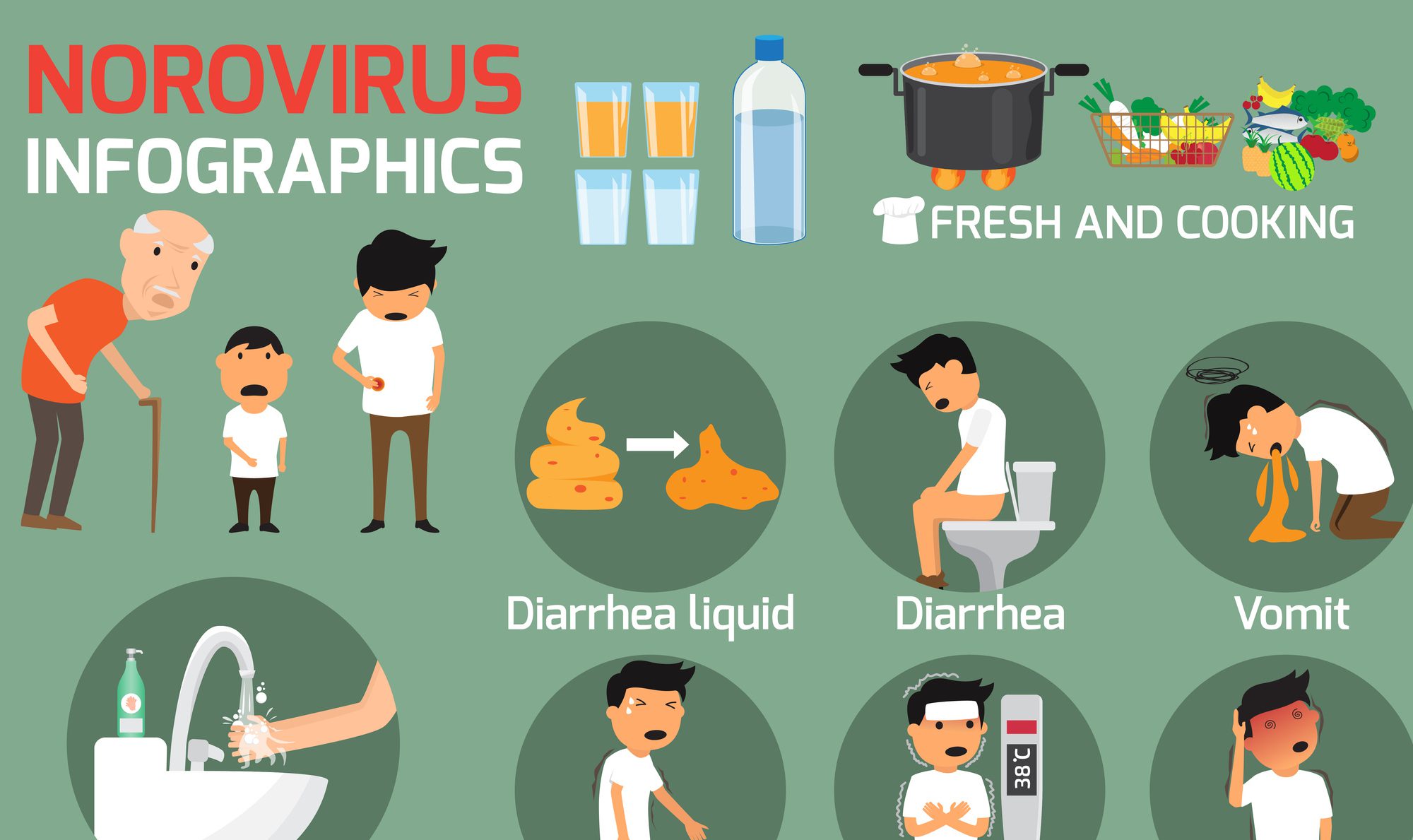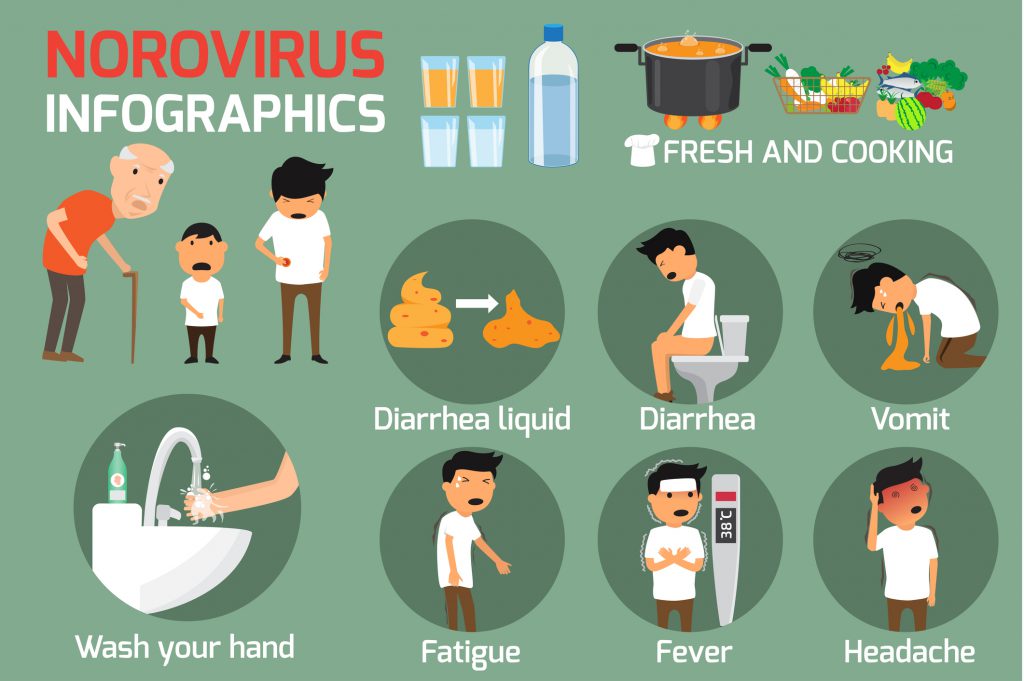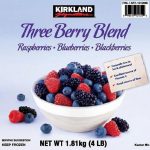
Norovirus is a contagious virus causing vomiting and diarrhea nausea and stomach pains and outbreaks are quite common. It spreads easily and quickly through contaminated food products as well as from other people and contaminated surfaces. Since one in six Americans gets sick from eating contaminated food each year, it is in everyone’s best interest to take a proactive and preventative approach to the problem.

Hepatitis A is a highly contagious liver infection caused by the Hepatitis A virus spread from contaminated food, water or contact with someone else who is infected. Symptoms include fatigue, abdominal pain, jaundice, fever and dark urine. Fortunately, the occurrence is quite rare with fewer than 20,000 cases in the United States reported annually. It is preventable by vaccine and resolves itself within a few days to weeks with proper medical treatment.
Since November 2018, the FDA (U.S. Food & Drug Administration) has been sampling frozen berries for Hepatitis A virus and Norovirus from both domestically produced and imported product. Samples of frozen berries have been and are now being collected from retail stores, warehouses, processors and distribution centers, as well as from ports of entry, and cold storage facilities for imported goods.
 Recently there have been numerous recalls of frozen berries due to the potential of Hepatitis A (HAV) and Norovirus. Now that the summer is here with warmer temperatures, people are eating even more raw berries in products like frozen smoothies, ice cream and fruit salads. The potential for concern arises because berries are consumed without having undergone a “kill step” such as cooking that reduces or eliminates pathogens. Freezing the fruit generally doesn’t kill the pathogen, since pathogens can survive at low temperatures. Eating berry fruits that have been cooked in baked goods and pies should not present any risk.
Recently there have been numerous recalls of frozen berries due to the potential of Hepatitis A (HAV) and Norovirus. Now that the summer is here with warmer temperatures, people are eating even more raw berries in products like frozen smoothies, ice cream and fruit salads. The potential for concern arises because berries are consumed without having undergone a “kill step” such as cooking that reduces or eliminates pathogens. Freezing the fruit generally doesn’t kill the pathogen, since pathogens can survive at low temperatures. Eating berry fruits that have been cooked in baked goods and pies should not present any risk.
Fruits like strawberries, blackberries and raspberries may become tainted with the virus or bacteria quite easily. “Strawberries, raspberries and blackberries are delicate and may become contaminated with bacteria or viruses if handled by an infected worker who does not use appropriate hand hygiene or if exposed to contaminated agricultural water or a contaminated surface, like a harvesting tote.”

The recent increased sampling by FDA is part of the FDA’s new sampling approach under FSMA (the Food Safety Modernization Act) in an effort to keep contaminated products from reaching consumers. The FDA’s current approach is to collect a large number of samples of targeted foods (such as frozen berries) over a relatively short period of about 18 months, to ensure enough data has been collected to make informed decisions. This helps the FDA determine if there are any commonalities with regard to origin, variety or season, while previously the FDA only collected a relatively small number of samples of many different commodities over many years. When the hepatitis A virus (HAV) or Norovirus is found, the firm is notified of the findings and FDA will work with that company or in some cases may take action such as placing a company or importer on alert, oversee a recall or issue a public warning.
AFFI, the American Frozen Food Institute, is the national trade association working on behalf of all members to advance frozen foods and food safety. Recently AFFI has been working tirelessly to assist its members through this tedious process of frozen berry recalls and is particularly concerned with the methodology of collection by FDA. Alison Bodor, President and CEO of AFFI wrote to the members in May 2019 that:
“AFFI has also had multiple conversations and correspondence with FDA to discuss our primary concern, which is that frozen berries will be regarded by the consumer as a risky food that should be cooked to reduce the risk of foodborne illness when, as we know, frozen berries are a low-risk, ready-to-eat food. We have requested that FDA revise the Constituent Update to better represent the purpose of the sampling assignment and the low risk that frozen berries represent when consumed as intended (as a ready-to-eat food).”
On Friday, June 21, AFFI provided an update indicating frozen berry sampling may be modified as follows:
“The American Frozen Food Institute (AFFI) was contacted by FDA Deputy Commissioner Frank Yannas Friday afternoon. While FDA is not yet prepared to confirm their next steps on the sampling program, the deputy commissioner conveyed that the program will likely be modified to address the concerns that AFFI has raised. We believe this means that moving forward presumptive positive PCR results will not be considered violative and therefore, should not trigger a class II recall or market withdrawal and associated public statement. We expect FDA will confirm modifications to the berry sampling program next week.
In the meantime, should your company experience pressure from FDA to issue a public announcement, please contact AFFI. We will continue to keep you apprised of the latest developments and our progress with FDA.”
This is excellent news, but despite the potential changes in methodology of sampling, all of the recent recalls underscore the importance of compliance with FSMA regulations and the advancement of food safety practices in our industry.
- FDA Sampling program; Interim Data: FY 19-20 Frozen Berries (Strawberries, Raspberries and Blackberries)
- affifoodsafety.org
- cdc.gov
- https://stopfoodborneillness.org/pathogen/norovirus/
- https://www.livescience.com/42944-what-is-norovirus.html
- foodpoisoningbulletin.com
- https://www.fda.gov/food/alerts-advisories-safety-information/public-health-alert-concerning-hepatitis-virus-contamination-kroger-brand-frozen-blackberries-and
- https://dailyhornet.com/2019/walmart-save-a-lot-recall-frozen-berries-for-norovirus-risk/
ノロウイルス感染症は、嘔吐、下痢、腹痛などを引き起こし、散発的に発生しています。汚染された食品のほか、感染者が触れた物などを介して、あっという間に広がります。米国では食中毒の年間発生割合が6人に1人に達していますから、予防を心がけることは誰にとっても非常に重要です。
また、A型肝炎は、A型肝炎ウイルスによって引き起こされる肝炎です。感染力が非常に強く、汚染された水や食品だけでなく、感染者との接触を介しても広がります。症状は、倦怠感、腹痛、黄疸、発熱、濃色尿などです。幸いにも発症は多くなく、米国での報告件数は年間2万件未満です。ワクチンで予防できるうえ、適切に対処すれば数日から数週間で回復します。
米国の食品医薬品局(FDA)は、2018年11月以降、国産品と輸入品の冷凍ベリー類をサンプル抽出して、A型肝炎ウイルスとノロウイルスを試験しています。FDAがサンプルを入手している場所は、小売店、倉庫、加工処理施設、配送センターなどで、輸入品の場合は港湾や冷蔵倉庫も含まれます。
A型肝炎ウイルスやノロウイルスに汚染された可能性があるとして冷凍ベリー類がリコールされる事態が、ここしばらくの間に相次ぎました。夏の到来で気温が上がるのとともに、スムージー、アイスクリーム、フルーツサラダなどに生のベリー類を入れて食べる人も多くなります。ベリー類は、病原体を抑制または除去する調理などの処理を経ないで消費されることから、懸念が生じます。病原体は低温下でも生きられるため、果物を冷凍しても通常は病原体が殺菌されるわけではありません。焼き菓子やパイなどで加熱調理されたベリー類を食べる分には、リスクはないはずです。
イチゴ、ブラックベリー、ラズベリーなどは、ウイルスやバクテリアに汚染されやすい果物です。「イチゴ、ラズベリー、ブラックベリーは繊細で、適切な手の衛生措置を講じていない作業員が触れたり、汚染された農業用水や収穫用バッグなどに接触したりすれば、バクテリアやウイルスに汚染される可能性がある」と、FDAは説明しています。
FDAによるサンプル試験の拡大は、FSMA(食品安全近代化法)で定められた新しいサンプル試験のアプローチの一環で、汚染された食品が消費者に届かないようにするための策です。このアプローチでは、(今回の冷凍ベリー類のように)一定の食品にターゲットを定めたうえで、約18カ月という比較的短期間にサンプルを大量に入手してデータを収集し、その情報に基づいて決定を下します。これによりFDAは、産地、品種、季節などに共通点があるかどうかを見極められるようになります。以前のアプローチでは、多数の食品のサンプルを比較的少量のみ、ただし何年にもわたって収集していました。A型肝炎ウイルスやノロウイルスが見つかった場合は、その会社に通達して、FDAが対応に協力します。場合によっては、FDAがメーカーや輸入会社に警告を発し、リコールを監督し、一般市民に告知することもあります。
米国冷凍食品協会(AFFI)は、冷凍食品とその安全性の進歩のために活動している全米規模の業界団体です。最近では、冷凍ベリー製品のリコールにまつわる煩雑なプロセスで加盟企業を精力的に支援し、特にFDAによるサンプル収集の方法にも懸念を表明してきました。AFFIのアリソン・ボドー代表は、2019年5月の会報で次のように説明しました。
「AFFIは、FDAと幾度も協議を重ね、連絡を取り合って、当団体の最大の懸念について話し合ってきました。その懸念とは、冷凍ベリー類が消費者から危険な食べ物と見なされてしまい、食中毒のリスクを減らすために調理が必要だと思われるようになることです。実際には、私たち全員が知っているとおり、冷凍ベリー類はリスクの低いレディ・トゥ・イート食品です。当団体では、FDAに対し、告知情報を改訂して、サンプル試験の目的をより明確に説明するとともに、適切に(レディ・トゥ・イート食品として)消費すれば冷凍ベリー類はリスクが低いことを伝えるよう、要請しました。」
さらに、AFFIは6月21日(金)、冷凍ベリー類のサンプル試験が次のように変更される可能性があるとの更新情報を発信しました。
「AFFIは金曜日午後、FDAのフランク・ヤナス副局長から連絡を受けました。このサンプル試験制度に関するFDAの次のステップは未定としたうえで、ただしAFFIの懸念に対応するため、この制度を一部変更する可能性が高いと、副局長は伝えてきました。今後は、PCR(ポリメラーゼ連鎖反応)法の試験結果で陽性と推定された場合も、違反とは見なされず、ゆえに第2種リコールまたは自主回収、および一般告知の対象にはならないことを意味すると、私たちは考えています。来週にも、FDAからベリー類のサンプル試験の変更内容をあらためて確認してもらえる予定です。
その間、FDAから一般告知をするようプレッシャーをかけられた場合は、AFFIにご一報ください。今後も最新情報とFDAとの協議の内容をお届けしていく所存です。」
これは朗報です。ただし、サンプル試験の方法に変更の可能性があるとはいえ、最近のリコールの事例は、FSMAを順守すること、そしてこの業界の食品安全性対策を前進させることの重要性をあらためて浮き彫りにしています。
- FDAサンプル試験制度(中間データ):2019~2020年度の冷凍ベリー類(イチゴ、ラズベリー、ブラックベリー)
- affifoodsafety.org
- cdc.gov
- https://stopfoodborneillness.org/pathogen/norovirus/
- https://www.livescience.com/42944-what-is-norovirus.html
- foodpoisoningbulletin.com
- https://www.fda.gov/food/alerts-advisories-safety-information/public-health-alert-concerning-hepatitis-virus-contamination-kroger-brand-frozen-blackberries-and
- https://dailyhornet.com/2019/walmart-save-a-lot-recall-frozen-berries-for-norovirus-risk/
